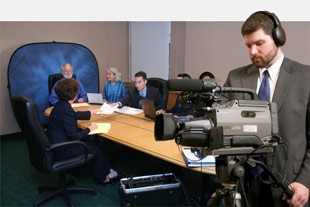High-Resolution Legal Videography for Essential Evidence Recording.
High-Resolution Legal Videography for Essential Evidence Recording.
Blog Article
The Function of Lawful Videography in Depositions and Trials
Legal videography has actually become a necessary tool in both depositions and tests, providing a multifaceted strategy to recording witness statements. By capturing not just the talked word but additionally the nuances of non-verbal interaction, this tool improves the credibility of testaments and preserves essential proof for future proceedings (legal videography). As attorneys progressively recognize its worth, it triggers a deeper exam of just how these aesthetic records can affect juror perceptions and trial outcomes. What implications might these advancements hold for the future of legal technique?

Relevance of Legal Videography
Legal videography plays a critical function in the documents and discussion of depositions and trials. This customized field incorporates technical skills with legal knowledge to produce a reputable record of proceedings that can considerably affect case results. The visual facet of legal videography improves the understanding of witness testament, enabling jurors and courts to observe not only the spoken words but additionally the attitude, feelings, and body language of the witnesses.
Furthermore, lawful videography offers an unbiased account of events, lessening the capacity for misinterpretation that can accompany composed records alone. This aesthetic documents acts as a vital device throughout trial discussions, helping with a more clear and even more convincing narrative for both plaintiffs and defendants. In addition, the capacity to replay video clip sectors throughout court process enables lawful groups to stress key factors, enhancing their debates properly.
The importance of lawful videography expands beyond the court room; it likewise plays an important duty in protecting evidence for future referral, whether for appeals or additional legal activity. Because of this, its assimilation into the lawful process is essential for making certain a reasonable and precise depiction of the truths, inevitably contributing to the search of justice.

Refine of Legal Videography
While capturing the subtleties of depositions and tests, the procedure of legal videography involves a number of essential steps that guarantee high-grade, accurate recordings. An expert lawful videographer prepares by assessing the situation materials and comprehending the particular demands of the deposition or trial. This preparation includes familiarizing themselves with the participants and the context, which aids in capturing essential information.
On the day of the recording, the videographer establishes the required devices, which commonly consists of high-def electronic cameras, microphones, and correct lights. Making certain optimum angles and audio quality is important, as it directly affects the effectiveness of the recording. The videographer communicates with attorneys and individuals to develop methods, making sure that everyone understands the recording procedure.
Throughout the deposition or trial, the videographer carefully tape-records the proceedings, paying attention to both spoken and non-verbal hints. This consists of catching the attitude and reactions of witnesses and attorneys. After the session ends, the videographer might edit the footage for quality and compliance with legal requirements, producing an end product that precisely reflects the process for future recommendation and use in lawful contexts.
Benefits in Depositions
The consolidation of videography in depositions provides numerous benefits that improve the overall procedure of gathering proof. One main advantage is the ability to catch witness testaments with visual and auditory fidelity, giving an extra precise representation of the witness's behavior, tone, and body language. This multidimensional approach enables attorneys and courts to assess credibility a lot more efficiently than traditional written records alone.
Additionally, videographed depositions function as an effective tool for maintaining testimony. Needs to a witness come to be not available for test, their tape-recorded deposition can be played in court, recommended you read making certain that their evidence stays accessible and appropriate. This facet considerably lowers the threat of losing vital information that could affect instance outcomes.

Lastly, videography enhances the overall professionalism and reliability of the deposition process, instilling confidence in clients concerning the thoroughness of their legal representation (legal videography). By leveraging technology, legal professionals can substantially enhance the efficiency of depositions
Influence On Trials
In numerous trials, the assimilation of videography can dramatically influence the presentation of proof and the court's understanding. Legal videography captures witness testaments and essential proof in a dynamic format, permitting jurors to involve with the material on multiple degrees. This aesthetic component boosts the narration element of a test, giving context and psychological vibration that conventional text-based evidence might lack.
Moreover, video clip recordings can work as effective Homepage devices for impeachment during cross-examination. When inconsistencies emerge in between a witness's previous declarations and their court statement, video clip evidence offers an unbiased recommendation that can sway jurors' point of views. This immediacy and clearness can bolster the reputation of a celebration's story while all at once threatening opposing disagreements.

Future Trends in Legal Videography
As we look toward the future of legal videography, several emerging trends promise to reshape its role within the court. read this post here One substantial fad is the assimilation of fabricated knowledge (AI) in video clip evaluation and editing and enhancing. AI can simplify the procedure of recognizing crucial minutes in videotaped depositions, permitting lawyers to swiftly access appropriate material, thus enhancing efficiency in case prep work.
In addition, the surge of digital fact (VR) and enhanced reality (AR) technologies is anticipated to change exactly how jurors experience evidence. legal videography. By submersing jurors in a substitute setting, these innovations can offer a more extensive understanding of complicated situations, leading to even more educated deliberations
Moreover, the raising demand for remote depositions, sped up by the COVID-19 pandemic, will likely continue. Lawful videographers will need to adjust to new software program and systems to make sure high-quality recordings in digital setups.
Last but not least, the growing focus on data security will certainly necessitate more stringent protocols for saving and sharing video proof. As the lawful landscape develops, lawful videographers should remain abreast of these patterns to keep their significance and performance in the judicial process.
Verdict
In summary, lawful videography offers an important feature in the judicial process, boosting the integrity of depositions and tests. By recording the nuances of witness testaments, this medium not just maintains important proof but likewise aids in providing details successfully to jurors. The value of aesthetic documentation in examining credibility and promoting cross-examination can not be overstated. As modern technology continues to advance, lawful videography is poised to further change its role within the lawful landscape.
Report this page